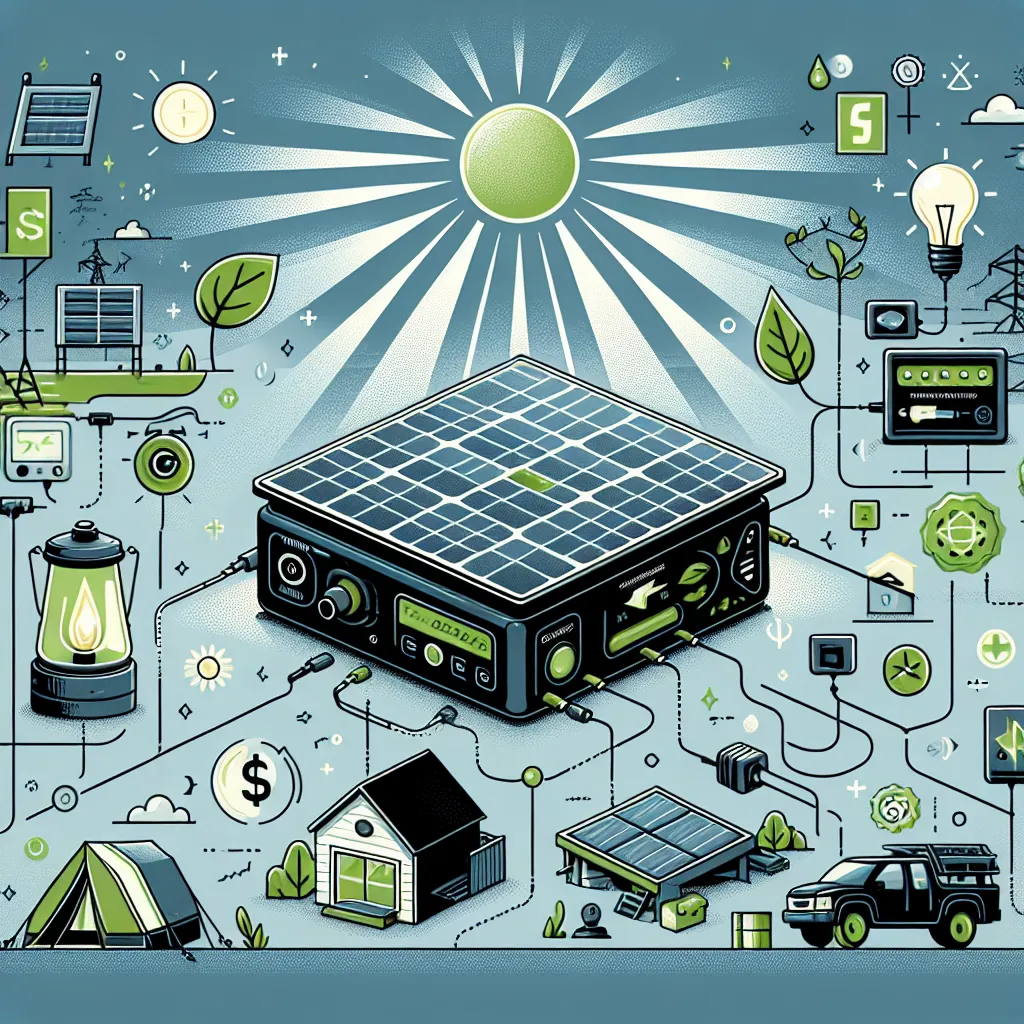The Advantages and Applications of Solar Powered Generators
The Advantages and Applications of Solar Powered Generators
Solar powered generators are devices that convert solar energy into electrical energy, providing a sustainable and environmentally friendly power source. With the increasing demand for renewable energy solutions, solar powered generators have gained popularity in various applications. This article explores the advantages of solar powered generators and their diverse range of applications.
Advantages of Solar Powered Generators
Solar powered generators offer several advantages over traditional generators that rely on fossil fuels. Here are some key benefits:

1. Renewable Energy Source
Solar energy is an abundant and renewable energy source that is available almost everywhere on the planet. Unlike fossil fuels, which are finite and contribute to climate change, solar power is clean and sustainable. By harnessing the power of the sun, solar powered generators provide a long-term solution for power generation.
2. Environmentally Friendly
Solar powered generators produce zero greenhouse gas emissions, making them an eco-friendly alternative to fossil fuel-based generators. They do not contribute to air pollution, water pollution, or noise pollution. By reducing reliance on fossil fuels, solar powered generators help combat climate change and promote a cleaner and healthier environment.
3. Cost Savings
While the initial cost of installing a solar powered generator may seem high, it offers significant long-term cost savings. Once installed, the generator operates on free solar energy, reducing or eliminating electricity bills. Additionally, solar powered generators require minimal maintenance compared to traditional generators, resulting in lower operating costs over time.
4. Versatility
Solar powered generators come in various sizes and configurations, making them suitable for a wide range of applications. From small portable units for camping and outdoor activities to larger systems that can power homes and businesses, solar generators can be tailored to meet specific power requirements. This versatility makes them a flexible solution in different settings.
5. Silent Operation
Unlike traditional generators that can be noisy and disruptive, solar powered generators operate silently. This feature is particularly valuable in residential areas, outdoor events, and other environments where noise pollution is a concern. The quiet operation of solar generators ensures a peaceful and undisturbed atmosphere.
6. Remote Power Generation
Solar powered generators can be used in remote areas where grid electricity is inaccessible or unreliable. They provide a reliable and independent power source for off-grid cabins, remote research stations, or disaster-stricken regions. With their ability to harness solar energy, these generators offer a sustainable solution for powering remote locations.
Applications of Solar Powered Generators
Solar powered generators find applications in various sectors due to their advantages and versatility. Here are some common applications:
1. Residential Use
Solar powered generators can be used in homes to supplement or replace traditional grid electricity. They store excess solar energy in batteries, which can be used during periods of low sunlight or power outages. Solar generators can help reduce reliance on the grid, lower electricity bills, and provide backup power for essential devices.
2. Camping and Outdoor Activities
Portable solar powered generators are popular among campers, hikers, and outdoor enthusiasts. These compact units provide a reliable source of power for charging electronic devices, running small appliances, or lighting campsites. With their lightweight and easy-to-use design, solar generators enhance the convenience and comfort of outdoor adventures.
3. Emergency Preparedness
Solar powered generators are invaluable during emergencies or natural disasters when the grid power may be disrupted. They can provide essential power for medical equipment, communication devices, lighting, and refrigeration. By having a solar generator as part of an emergency preparedness plan, individuals and communities can ensure access to electricity when it is needed most.
4. Construction and Remote Work Sites
Construction sites and remote work locations often lack access to grid electricity. Solar powered generators can provide a reliable and independent power source for running tools, equipment, and lighting. They eliminate the need for noisy and polluting diesel generators, offering a more sustainable and efficient solution for the construction industry.
5. Agriculture and Farming
Solar powered generators are increasingly used in agricultural settings. They can power irrigation systems, electric fences, lighting, and other farm equipment, reducing reliance on grid electricity or diesel generators. By utilizing solar energy, farmers can lower operational costs, increase sustainability, and reduce their carbon footprint.
6. Humanitarian Aid and Developing Regions
In areas without reliable access to electricity, solar powered generators can be deployed for humanitarian aid and development projects. They can power medical clinics, schools, water pumps, and other essential infrastructure. By providing clean and sustainable energy, solar generators contribute to improving living conditions and promoting economic growth in underserved regions.
Conclusion
Solar powered generators offer numerous advantages and find applications in various sectors. Their ability to harness renewable energy, reduce environmental impact, and provide cost-effective power solutions make them an attractive alternative to traditional generators. As technology advances and solar power becomes more accessible, solar powered generators will continue to play a crucial role in the transition towards a sustainable and greener future.
